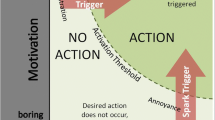Abstract
This paper describes the survey—conducted in Indonesian universities (UNIV) and high schools (HS)—whose concern is to examine preferences and influences of computer game for training. Comparing the students’ viewpoint between both educational levels could determine which educational level would satisfy the need of MAGNITUDE—mobile serious game for training inexperienced disaster responders—implementation. The survey involved 276 participants from two universities with various fields of study (engineering, social, and art) and two high schools that focused on the vocational education. The survey results show that 79 % of the participants (n = 226) believed that games could be used for training of disaster first responders. The results give a significant insight that UNIV education level would be more suitable than HS group for implementation of game for training purpose. The UNIV group had more interest than another one that the games could be used for training besides just for relaxing and leisure. Hence, to maximize the role of MAGNITUDE in such training, the UNIV students should be promoted as learning subjects.

Similar content being viewed by others
References
Boeker, M., et al. (2013). Game-Based E-Learning Is More Effective than a Conventional Instructional Method: A Randomized Controlled Trial with Third-Year Medical Students A. Szolnoki, ed. PloS One, 8(12), e82328–e82311.
Bourgonjon, J., et al. (2010). Students’ perceptions about the use of video games in the classroom. Computers & Education, 54(4), 1145–1156.
Caird-Daley, A., & Harris, D. D. (2008). Training decision making using serious games. pp.1–71. Available at: http://www.hfidtc.com/research/training/training-reports/phase-2/2-4-6-1-1-training-decision-making.pdf. Accessed 18 Dec 2014.
Chittaro, L., & Sioni, R. (2015). Serious games for emergency preparedness: Evaluation of an interactive vs. a non-interactive simulation of a terror attack. Computers in Human Behavior, 50(C), 508–519.
Cohen, D., et al. (2013). Emergency preparedness in the twenty-first century: Training and preparation modules in virtual environments. Resuscitation, 84(1), 78–84.
Corti, K. (2006). Games based Learning; A serious business application. PIXELearning. Available from: https://www.cs.auckland.ac.nz/courses/compsci777s2c/lectures/Ian/serious%20games%20business%20applications.pdf. Accessed 14 June 2015.
Cunningham, S. (2014). Indonesian smartphone shipments surge 55 % in 2014, Forbes. Retrieved from http://www.forbes.com/sites/susancunningham/2014/11/21/indonesian-smartphone-shipments-surge-55-in-2014/#76aef0282797. Accessed 25 May 2015.
Donovan, L. (2012). Pedagogical lead: the use of serious game in corporate sector. In: State of The Art Report. Learnovate Centre, Dublin, Ireland: Retrieved from http://www.learnovatecentre.org/wp-content/uploads/2013/06/Use_of_Serious_Games_in_the_Corporate_Sector_PRINT_FINAL.pdf. Accessed 15 Nov 2015.
Fulmer, T., et al. (2007). Organization-based Incident Management: Developing a Disaster Volunteer Role on a University Campus. Disaster Management & Response, 5(3), 74–81.
Giammarco, E. A., et al. (2015). Video game preferences and their relation to career interests. Personality and Individual Differences, 73(C), 98–104.
Graafland, M., Schraagen, J. M., & Schijven, M. P. (2012). Systematic review of serious games for medical education and surgical skills training. British Journal of Surgery, 99(10), 1322–1330.
Haferkamp, N., et al. (2011). Training disaster communication by means of serious games in virtual environments. Entertainment Computing, 2(2), 81–88.
Hartley, J. (2014). International Journal of Clinical and Health Psychology. International Journal of Clinical and Health Psychology, 14(1), 83–86.
Jagger, S., Siala, H., & Sloan, D. (2015). It’s All in the Game: A 3D Learning Model for Business Ethics. Journal of Business Ethics, pp., 1–21.
Karakus, T., Inal, Y., & Cagiltay, K. (2008). A descriptive study of Turkish high school students’ game-playing characteristics and their considerations concerning the effects of games. Computers in Human Behavior, 24(6), 2520–2529.
Michael, D., & Chen, S. (2005). Proof of learning: assessment in serious games. http://www.gamasutra.com/view/feature/2433/proof_of_learning_assessment_in_.php. Accessed 2 Sept 2015
Prensky, M. (2001). Digital Game-Based Learning. New York: McGraw-Hill.
Smith, R. (2010). The Long History of Gaming in Military Training. Simulation & Gaming, 41(1), 6–19.
Sordoni, A. et al., 2010. Design of a Participatory Decision Making Agent Architecture Based on Argumentation and Influence Function -- Application to a Serious Game about Biodiversity Conservation. pp.1–15.
Sung, H.-Y., Hwang, G.-J., & Yen, Y.-F. (2015). Development of a contextual decision-making game for improving students’ learning performance in a health education course. Computers & Education, 82(c), 179–190.
von Hulst, A. & Ruijsendaal, M., (2014) Serious Gaming for Complex Decision Making. Available at: http://ceur-ws.org/Vol-898/pdsg8.pdf [Accessed March 18, 2014]
Walsh, L., et al. (2013). Core Competencies for Disaster Medicine and Public Health. Disaster Medicine and Public Health Preparedness, 6(01), 44–52.
Wattanasoontorn, V., et al. (2013). Serious games for health. Entertainment Computing, 4(4), 231–247.
Whittaker, J., McLennan, B., & Handmer, J. (2015). A review of informal volunteerism in emergencies and disasters_ Definition, opportunities and challenges. International Journal of Disaster Risk Reduction, 13(C), 358–368.
Author information
Authors and Affiliations
Corresponding author
Rights and permissions
About this article
Cite this article
Wahyudin, D., Hasegawa, S. & Kamaludin, A. Students’ viewpoint of computer game for training in Indonesian universities and high schools. Educ Inf Technol 22, 1927–1945 (2017). https://doi.org/10.1007/s10639-016-9522-9
Published:
Issue Date:
DOI: https://doi.org/10.1007/s10639-016-9522-9




